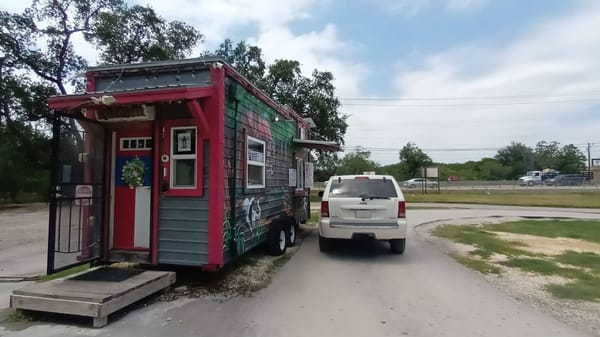30 Day Move Out Notice | How To Properly Tell Your Landlord You're Leaving
Learn how to properly give a 30-day notice to vacate, understand its importance, and ensure a smooth transition when ending your lease. Read more here!

Depending on which state you live in, and what your rental agreement verbiage refers to it as, your 30 day notice to vacate form may be called any number of things such as:
- 30 Day Notice of Intent To Vacate
- 30 Day Notice Move Out
- 30 Day Move Out Notice
- 30 Day Notice to Vacate
- 30 Day Lease Termination Notice
- 30 Day Letter to Vacate
- 30 Day Non-Renewal Notice
- 30 Day to Quit Notice
Regardless of what the official form is called where you live, the purpose of the notice remains the same: You need to notify your landlord that you are planning to terminate your tenancy by not renewing your lease, and you intend to move out of the apartment (or house) by a set date.
ExpertTexan.com participates in affiliate programs. Any links provided in the text below may be affiliate links that we benefit from financially. Please use our links as they help us to be able to continue providing you with quality content – free of charge.
In otherwords, it's essentially a lease termination letter.
Important Note: I am not a lawyer, and this article is not intended to be misconstrued as legal advice or council of any kind because it is NOT legal or financial advice. Always review your state and city laws, your lease documents, and consult with an attorney who deals with rental law if you have any specific questions as it relates to your particular case.
Many cities and states offer a tenant rights hotline that you can call, or a website that provides renter rights info free of charge. In Austin, Texas for instance, the Austin Tenant's Council provides legal information regarding your rights as a renter in the city of Austin, TX.
How far in advance should I notify my landlord that I'm leaving?
Depending on what your lease says, the amount of time that you need to give a written notice to move out may range from 30 days to as far out as 120 days. Rarely does the requirement for a notice to vacate exceed 120 days, but I'm sure it's possible.
In most cases, you'll find that the average lease commonly requires either a 30 or 60 day notice to vacate letter.

Likewise, leases commonly require that you notify your landlord or property manager that you do not intend to renew your lease at a bare minimum of 30 days out, even if your lease is currently "month-to-month".
Regardless of what your written lease says, as a courtesy, you should always do your best to give your property manager as long of a notice period as possible to let them know when you'll be vacating the premises. That allows them to find a tenant to move in shortly after you move out.
How do I give a 30 day move out notice to my landlord?
In most cases you need to give a 30 day move out notice IN WRITING. The 30 day move out notice must be delivered to the property manager no later than 30 days prior to your scheduled move out date. Although it's best to provide it well before that if possible.
If it's not in writing - it never happened.
In addition, you should request a confirmation that it was received and documented.
I've seen too many scenarios play out where a 30 day notice to vacate was provided by the tenant to the property management company, only for it to be lost, misplaced, or placed in the tenants file without ever being documented in the system.
There are a few ways you can provide a 30 day notice to move out and get confirmation it was received:
- Via USPS First Class Mail w/ Tracking & Signature Required
- Request a SIGNED and DATED copy of the 30 day move out notice from the office
- Request an email from the landlord or property manager from their official management email address confirming they've received your notice and have updated their system to reflect your scheduled move out date.

IMPORTANT NOTE: Some leases may dictate that you HAVE to provide the official 30 day move out notice provided by the leasing manager. This may be an official legal document that's considered a "lease addendum" that you must fill out in its entirety and the leasing office has to sign.
DOUBLE CHECK to make sure whether or not your lease requires that an "official intent to move out form" needs to be filled out. If you just send an email (or a letter) as your 30 day move out notice, but didn't fill out the official lease form - they may not accept it which means you never submitted anything.
What information does my 30 day move out notice need to include?
In most cases, a 30 day notice to move out is going to require the following information:
- Your first and last name
- Your address
- Your contact information
- Your lease start/end date
- The date your intend to move out
- The date/time you intend to turn in your keys
- Your new address you're moving to (this is so they can send you final account statements, refund checks, etc., as required by law)
If your lease ends on the 5th of the month, and you want to move out on the 6th, you'll need to check your lease to determine if that's possible, and get an approval in writing from the property manager or landlord.
Likewise, some leases will dictate the exact time (and method or place) by which keys need to be turned in on your move out date to avoid another day of rental charges. You'll want to confirm that in your lease as well.

It's similar to a hotel - check out might be at 11 AM and if you don't check out at 11 AM, you may be charged for an additional day.
Some long term rentals have similar rules outlined in the lease.
For example: If you don't turn in keys by 5 PM on your scheduled move out date, you may be charged an additional day of rent.
Pro Tip: If a tenant does not move out on the scheduled move out date, that's generally referred to as a "holdover" in rental terminology.
How do I notify my landlord that I need to move out prior to my lease end date?
If your lease is nowhere near the end date, but you need to terminate your lease early, then you'll probably need to follow a slightly different set of rules for moving out.
In general, every lease is going to have a clause that addresses an early termination.
Of course you will have to check your lease to see exactly what it says, but in general, these are some of the typical requirements:
- 30, 60, or 90 day notice to request an early termination +
Some leases may not offer any kind of early termination or option to sublet. In which case, you're likely out of luck and may just have to pay through the end of the lease term.

However, it's always good to check your lease with your state rental laws. Sometimes they are in contradiction with each other, and state law generally supersedes anything your lease document may say.
There are exceptions to the rule, however. In cases of domestic abuse, military deployment, and a few other scenarios, you may be able to terminate your lease early without penalty. Your lease (and the law) also typically allows for a much shorter timeframe for delivering a notice to vacate to your landlord in those scenarios.
What do I need to do on the day that I move out of the rental?
Submitting a 30 day move out notice is just part of the process. You still have some things you need to do on the day that you move out!

Here are some of the things you need to consider on move out day:
- Check the lease to see what requirements are involved regarding cleaning your rental and the condition in which it needs to be turned back over to the landlord.
Some leases require that you have a "professional cleaning service" clean the rental upon move out and may even ask for a receipt as proof. Make sure you know if your lease has any such requirements.
- Check the lease to verify where and when the keys must be turned in.
One lease may require that you leave the keys in the rental, while others may require that you return them to a physical office. Yet others may require that you mail them by certified mail with tracking. And even others may not have any key at all if they're electronic lock pads, and those leases may have different requirements than a lease dealing with physical keys.
- Check the lease to see if you're required to do an in-person walk-through of the rental with the property manager.
Some leases may state that you need to walk the rental with the property manager on the day that you move out once all of your personal items have been removed from the rental property. Others may not require it, but it might be a good idea to request a walk-through all the same. This can help you avoid any potential unexpected charges on your final account statement 2 weeks later.
- When you turn over possession of the rental back to the landlord, send it in writing immediately and get confirmation in writing.
Any time you are dealing with a legal lease contract, it's essential that you get important things documented in writing. One of the most important things to get in writing is confirmation that the property manager understands that you have moved out and you are no longer in possession of the rental.
This written confirmation will help should any unforeseen circumstances come into play. For example, if you move out at 7 PM and turn over the possession of the rental to your landlord, the property is now their responsibility.
For example: If someone breaks into the property, or a water pipe breaks overnight, etc., after 7 PM, it's on them since you are no longer in possession of the rental.
A simple email confirming you have moved out and turned in the keys can be helpful:
"To Whom it Concerns,
Per the terms of the lease, I have moved all of my belongings out of the rental. I have turned in keys per the lease requirements by placing them in the drop box at 6:45 PM Central Time at 123 ABC Road, ABC, Texas.
Best Regards,"
Might be helpful taking a video, or picture showing you dropping the keys in the drop box, or leaving them in the office, etc.
Remember, if it's not documented in writing - it never happened.
What happens if I don't give a notice to landlord about moving out?
In most cases, your lease or rental agreement spells out what will happen if you do not notify your rental manager (within the time frame dictated by the lease) that you intend to leave, even if the lease "end date" has come and gone.
Just because the lease end date has passed, doesn't necessarily mean your lease has actually ended.
For example, your lease may say that you will be charged the rental rate for the full 30, 60, or 90 days from the date that you gave your notice. In many cases, you will be charged regardless of what day you actually turn in your keys to the rental property and regardless of what the lease end date is.

Other leases may say that if you relinquish possession of the rental without adequate notice, they can charge you a termination or subletting fee.
And other leases may require that you continue to pay for the rental until you officially give adequate notice, even if you turn in the keys early.
Some leases may be a combination of those two things.
It may say that you're responsible for continuing to make sure the rental is paid for until either a) they can find a new renter, or b) your lease ends.
And even if your lease "end date" is up, many residential leases will roll over to a month to month lease without a proper notice to vacate.
So even though your "lease end date" has passed, if you did not provide adequate notice, chances are your lease is still valid under the law, and you will need to pay the month to month rate until you provide the proper tenant's notice of intent to move out.

You absolutely need to make sure that you've read and fully understand the terms of your lease as it relates to providing your property manager or landlord with a 30 day move out notice.
The financial and legal consequences for failing to follow the lease requirements regarding move out notices can be devastating and incredibly time-consuming.
30 Day Move Out Notice Template
The sample letter below is a generic guideline for what a 30 day move out notice would generally look like. Keep in mind that individual states, cities and leases may have varying guidelines regarding what is acceptable for a move out notice. Always use the legally authorized forms and/or verbiage that's required in your area.
Sample Letter:
[Date of the letter]
[First & Last Name]
[Address]
Dear [landlord or property manager's name],
This letter serves as my notice that I will be vacating my rental unit on [date you plan to vacate the rental property]. This letter is the 30-day notice as outlined in my lease agreement.
I will return my keys to [address indicated on lease as the required address to return keys to] on [date you plan to vacate the rental property].
Please send my security deposit within [x days as required by law] to [forwarding address].
If you have any questions please contact me at [phone number] or [email address].
Thank you.
Sincerely,
[First & Last Name]
[Tenant Signature]




